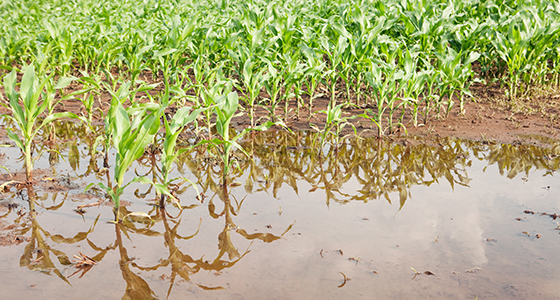
The Strain of Climate Change and the Need for Action
The impact of climate change is being felt around the world, creating a very real need for the global food and agriculture communities to shift in order to mitigate its lasting effects.

In November of 2018, I published a blog post about climate change and the future of food. It was on the heels of two meaningful reports—one was from the Food and Agriculture Organization (FAO) of the United Nations titled "The State of Agricultural Commodity Markets 2018," and the second was the U.S. National Climate Assessment report. Each of these indicated the clear and present danger of not addressing the climate emergency.
Now that we are two full months into 2020, new reports have published about the threats of climate change on the global economy and food security, including a McKinsey Global Institute report that estimates the probability of a 10% decrease in wheat, corn, soybean, and rice yields in any given year will increase from 6% today to 18% in 2050. This is in conjunction with a projected increase in catastrophic climate events such as heat waves, forest fires, floods, and cyclones.
Ahead of the 2020 World Economic Forum, business, political, academic and nongovernmental leaders were surveyed on the most significant threats to the economy, and according to the findings, climate change-related issues took the top five spots.
At the same time, according to the World Wildlife Foundation, the food system is Earth’s biggest user of land, accounting for 34% of the planet, as well as using 69% of all freshwater. The food system is also the most significant emitter of greenhouse gases, producing around 25%.
Climate change has been discussed and debated, written about in reports, and questioned by talking heads, but today, we know it is real, and its effects are being felt. A global phenomenon, climate change is multi-dimensional, and it is manifesting itself across various regions in different ways, such as droughts in Africa and floods in the United States. We have reduced the planet’s ability to recover and regenerate with far-reaching consequences, including potential food insecurity and the erosion of the food supply as we know it. By causing our food supply to become unreliable and stressing its efficiency, the global population is at a very real risk. The complex nature of this issue requires an acceleration in partnership efforts from multiple stakeholders, including government, academia, industry, nonprofit, and ultimately the community at large.
As a food scientist and chief science and technology officer at IFT, I recognize the meaningful role food scientists play in strategically addressing climate instability and the food system; however, the impact of our field needs to be amplified through collaborations with various disciplines and application of emerging technologies beyond current norms. A few notable priorities include sustainable agriculture processes that rely less on water and lower carbon footprint, nutrient-dense products in food-insecure regions, environmentally-sustainable packaging, and reduction of food loss and waste.
Science is an essential solution. And yet, so is swift action. Action requires the commitment of the global food ecosystem to shift human behavior in order to generate rapid change that will positively impact our planet and help prevent the climate-induced catastrophes that we are increasingly witnessing.
Maria Velissariou, Chief Science and Technology Officer, IFT
